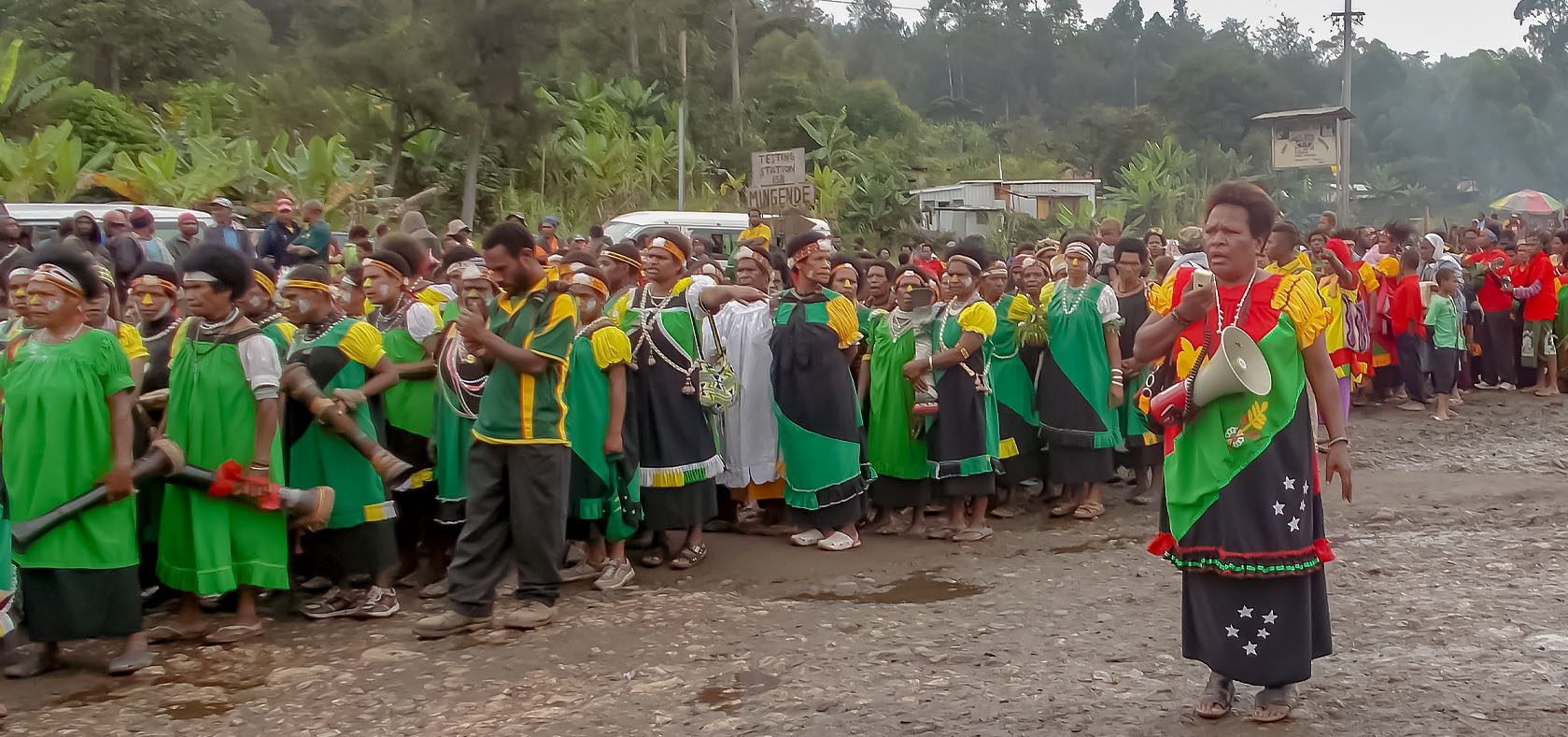The Women Make Change Stories in Papua New Guinea: Leading by serving others that is the story of Maggie Tine
Maggie Tine is the coordinator of the Highlands Region Catholic Women’s Association, which has 30,000 members representing all seven highlands provinces.
Date:

Serving as the Coordinator for the Highlands Region Catholic Women’s Association is a demanding role, but Maggie is passionate about using it to help others, "Lida meaning yu serve. Ino min Olsem yu stap antap na luk daun lo ol pipol. Lida min mi mas kam daun na bringim ol i kam antap." [Translation: Leadership is about serving others. Being a leader doesn't mean that you are above other people. It means you have to come down to their level and help them to rise up.]
Maggie has been elected Regional Coordinator three times, a testament to the positive impact she has had over the past 11 years in the role. The position supports other elected leaders from the five Catholic dioceses across the Highlands, and it is entirely voluntary with little to no financial gain.
In her role, Maggie has been at the forefront of implementing major programmes that aim to support communities with spiritual, economic, and political empowerment. One such programme is the Leadership and Administration programme. It aims to upskill women in leadership roles and give them opportunities to discuss different forms of leadership that exist in their community.
"Mipla trainim ol meri lida (long) how lo ronim ol program blo ol na lo kamap lida lo various level (olsem) political lida, community lida, councilor o insait lo femili"
[Translation: We train women leaders on how to run different programmes effectively at various levels of leadership, including political, community, councillor, and at family units.]
Over the years, Maggie has seen the impact the programmes have had on the women. "Mipla lukim Olsem ol meri inap lo helpim ol yet. Ol dedicatim ol yet insait lo ol kain spiritual activities, ol kisim strong. Narapla samting mipla lukim ol overcomim problems na painim healing taim ol stap insait lo grup (na) ol I hamamas. Na tu mipla lukim disla ol skills mipla lainim ol, ol yet painim ol masin na kamapim income generating project blo sustainim life blow ol yet."
[Translation: We realise that women can help themselves. They gain their strength by getting involved in spiritual activities. We also realise that they overcome their problems when they are part of a group. They find happiness and healing. Additionally, they are utilising the skills we have imparted in them by creating income-generating projects to sustain themselves.]
The leadership trainings have also encouraged women to take on roles in the law and justice sector, in public office, and as entrepreneurs. Seeing the impact of these programmes is what keeps Maggie committed to continuing to do what she does. "Mi yet mi wanpla victim blo neglect, mi kam aut lo neglected family." [Translation: I am a victim of neglect, I was neglected by my family when I was growing up.] Maggie speaks of her childhood.
"Mipla trainim ol meri lida (long) how lo ronim ol program blo ol na lo kamap lida lo various level (olsem) political lida, community lida, councilor o insait lo femili..”
— Maggie Tine, Highlands Region Catholic Women’s Association
It was the church, particularly the St. Therese sisters, who helped her out of that situation and provided her with a sense of community and belonging. Now Maggie feels the need to help others who might be facing similarly difficult circumstances.
"Mi lukluk raun em olsem, planti meri mipla wok wantaim, ol feisim wankain problem blo neglect, man lusim ol, polygamy, widows, unplanned pregnancies."
[Translation: I have observed that many of the women I am working with are facing the same problem of neglect from their families; their husbands left them for other women, some are in polygamous relationships, some are widows and some became pregnant unintentionally.]
Maggie continues to serve her community by working with them to identify their needs and connecting them with resources and organisations that can help. Maggie continues to serve her community by working with them to identify their needs and connecting them with resources and organisations that can help.
"Ehy mi mekim (displa wok) em mi pilim olsem disla em mission blo mi, my mission to serve, with or without money. Bikos taim mi lukluk lo diwai Cross, mi lukim olsem jesus em strong blo mi, na em givim disla wok mission lo mi."
[Translation: I feel that the work I am doing is my mission and that is to 'serve' with or without money. Because when I look at the cross, I see Jesus as my strength and I believe He has given me this mission to serve others.]
The Women Make Change Digital Stories are a collection of short stories aimed at highlighting the transformative impact of women’s leadership in communities in Papua New Guinea. The stories also captured the journeys of male advocates who are supporting women’s leadership. UN Women and the Queensland University of Technology co-produced the digital stories with the storytellers, who narrated and took photographs to complement their stories. Currently, the stories are used as resources to create spaces in communities and mass media to discuss women’s political leadership in Papua New Guinea. Since its independence in 1975, PNG has had only nine women elected to the National Parliament.
The Women Make the Change programme is funded by the Government of Australia and the Government of New Zealand.
The article was originally published in the Papua New Guinea Post-Courier on 3 March 2023.